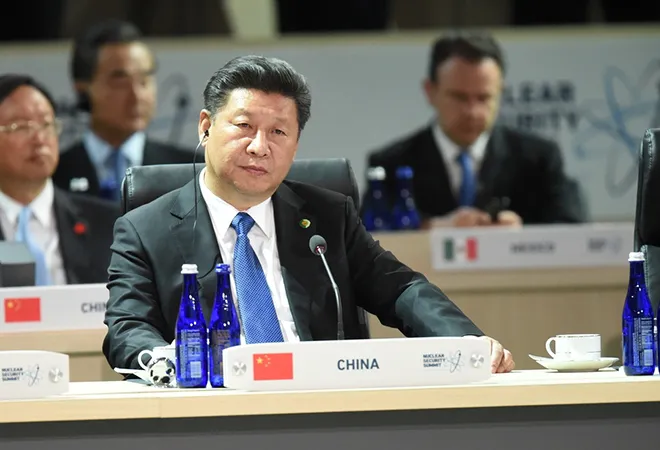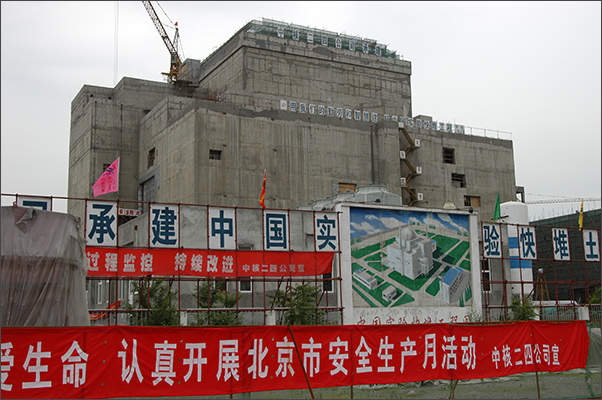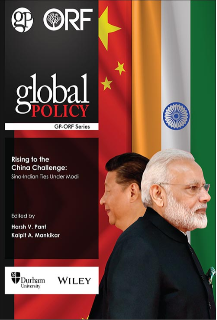 This is the seventeenth part in the series
This is the seventeenth part in the series The China Chronicles.
Read all the articles here.
India has renewed its diplomatic efforts to join the Nuclear Suppliers Group (NSG) ahead of the Group's June plenary in Switzerland. While New Delhi is hopeful that all the remaining 48 members of the Group would support its membership application, there is no optimism on China joining the consensus. Beijing has explained its opposition to India's entry to the Group citing repercussions for the Treaty on the Non-Proliferation of Nuclear Weapons (NPT), which India has not signed. But arguments from India suggest that Beijing's opposition is largely political — its commitment to support Pakistan diplomatically and its objective of limiting India's rise as a regional power. Despite hints from Beijing that it might be open to discussing India's prospective inclusion in the NSG, recent developments capture how those prospects now face the brunt of geopolitical tussle between India and China. This also captures how the two foreign policy objectives of the incumbent Indian government — confronting China politically and securing India's NSG membership — are in conflict with each other.
Since India submitted its formal membership application to the NSG in May 2016, Beijing publicly expressed its objection to it. In fact, at the beginning of the Seoul plenary of the Group in June 2016, Chinese diplomats were, quoted saying that India's membership application was not even on the agenda of the plenary. Beijing explained that its opposition to India's entry due to the detrimental effects on the NPT. India's inclusion in the NSG, Beijing believes, would affirm its status as a nuclear weapon state and since the NPT, the framework that holds the nuclear non-proliferation architecture, allows only the five designated nuclear weapon states under the NPT to be members of the NSG. Consequently, India's admission in the cartel would undermine the NPT.
India's inclusion in the NSG, Beijing believes, would affirm its status as a nuclear weapon state and since the NPT, the framework that holds the nuclear non-proliferation architecture, allows only the five designated nuclear weapon states under the NPT to be members of the NSG.
Beijing further added that if India's membership application is still to be considered, it should not be treated as an exception and a principled approach must be adopted that applies to all membership applicants that are not party to the NPT. China's "principled" opposition to India's entry arguably appeared more political when Pakistan, the only other country not party to the NPT and interested in joining the NSG, applied for membership to the Group a week after India, with support from China. The attempt of linking India's membership application to that of Pakistan's resulted in a fury of writings from India accusing China of infusing politics in the NSG and compromising the objective of universalising the norms of nuclear non-proliferation.
 The China Institute of Atomic Energy (CIAE) in Tuoli, June 2004 | Photo: Petr Pavlicek/IAEA
The China Institute of Atomic Energy (CIAE) in Tuoli, June 2004 | Photo: Petr Pavlicek/IAEA
While Beijing's official mouthpiece dismissed such accusations and called the Indian reportage "self-centered" and "self-righteous," it also noted that it is open to having a mature conversation with the Indian government, which "behaves decently and is willing to communicate." Some Indian experts too noted that since Beijing had committed itself too strongly to its opposition to India's NSG membership that it was difficult for it to change its stance on short notice at the Seoul plenary and that Beijing could be more flexible in the future. This argument was reinforced when Indian and Chinese officials met in September 2016 and thereafter in October 2016 with India's NSG membership on the agenda.
However, recent developments in India-China bilateral relations would only harden Beijing's opposition to India's NSG membership. While securing India's entry to the NSG has been a priority for New Delhi, the Indian government has signalled that another important foreign policy objective of India is to confront China politically on all fronts available. Consistent with this objective, New Delhi has raised the issue of China blocking designation of the Jaish-e-Mohammad chief, Masood Azhar, as a terrorist by the United Nations. New Delhi has allowed the Dalai Lama to visit the state of Arunachal Pradesh, territory that is claimed by China; and opposed the China-Pakistan Economic Corridor (CPEC), which passes through the disputed territory in the state of Jammu and Kashmir, forming part of China's Belt Road Initiative (BRI) among others. All of these developments have strained relations between India and China. An upset Beijing is likely to take diplomatic measures to hurt India and continue blocking India's bid for NSG membership.
Recent developments in India-China bilateral relations would only harden Beijing's opposition to India's NSG membership.
India has made significant efforts in getting China on board for its inclusion in the NSG, be it Prime Minister Modi raising the matter with President Jinping or New Delhi assuring Beijing that it would not block Pakistan's entry should other members agree. To top it all, recently there have been speculations that New Delhi has asked Moscow to convince Beijing or else it will put the Memorandum of Understanding with Moscow on construction of nuclear reactors at Kudankulam 5 and 6 on hold, although the Indian government officially denied putting such pressure on Russia. These efforts, however, are unlikely to bear any fruit for New Delhi as two of its foreign policy priorities of joining the NSG and confronting China geopolitically are in direct conflict with each other.
The views expressed above belong to the author(s). ORF research and analyses now available on Telegram! Click here to access our curated content — blogs, longforms and interviews.



 This is the seventeenth part in the series The China Chronicles.
Read all the articles
This is the seventeenth part in the series The China Chronicles.
Read all the articles  The China Institute of Atomic Energy (CIAE) in Tuoli, June 2004 | Photo:
The China Institute of Atomic Energy (CIAE) in Tuoli, June 2004 | Photo:  PREV
PREV


